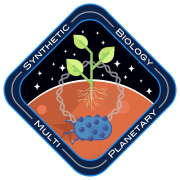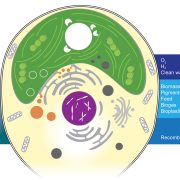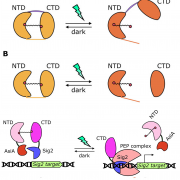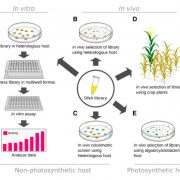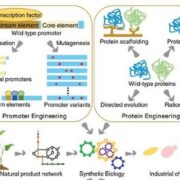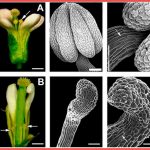Review: Synthetic biology in photosynthetic microbes: present and future (Plant Physiol)
 Photosynthetic microbes are emerging models for synthetic biology applications since they possess relatively simple physiology and cellular organization, fast growth in liquid culture, and facile genetic manipulation. In this paper, Vavitsas et al. review current synthetic biology tools and applications applied to cyanobacteria and algae. Cyanobacteria, such as Synechocystis, Synechococcus or Nostoc, offer excellent features to be used as cell factories for industrial biochemical production. They have high metabolic flexibility, fast growth and a rapid acclimation to environmental fluctuation. Eukaryotic systems are another alternative; algae such as Chlamydomonas reinhardtii and Phaeodactylum tricornutum now have information at the system-level for proteomics, transcriptomics, and genomics, which in combination with fast growth and easy culture at large scale make them very attractive for metabolic engineering applications. Currently available genetic parts (promoters, terminators, reporter genes), vectors and genome editing tools are listed, and current challenges and future directions are also discussed. (Summary by Humberto Herrera-Ubaldo). Plant Physiol. 10.1104/pp.19.00345
Photosynthetic microbes are emerging models for synthetic biology applications since they possess relatively simple physiology and cellular organization, fast growth in liquid culture, and facile genetic manipulation. In this paper, Vavitsas et al. review current synthetic biology tools and applications applied to cyanobacteria and algae. Cyanobacteria, such as Synechocystis, Synechococcus or Nostoc, offer excellent features to be used as cell factories for industrial biochemical production. They have high metabolic flexibility, fast growth and a rapid acclimation to environmental fluctuation. Eukaryotic systems are another alternative; algae such as Chlamydomonas reinhardtii and Phaeodactylum tricornutum now have information at the system-level for proteomics, transcriptomics, and genomics, which in combination with fast growth and easy culture at large scale make them very attractive for metabolic engineering applications. Currently available genetic parts (promoters, terminators, reporter genes), vectors and genome editing tools are listed, and current challenges and future directions are also discussed. (Summary by Humberto Herrera-Ubaldo). Plant Physiol. 10.1104/pp.19.00345



